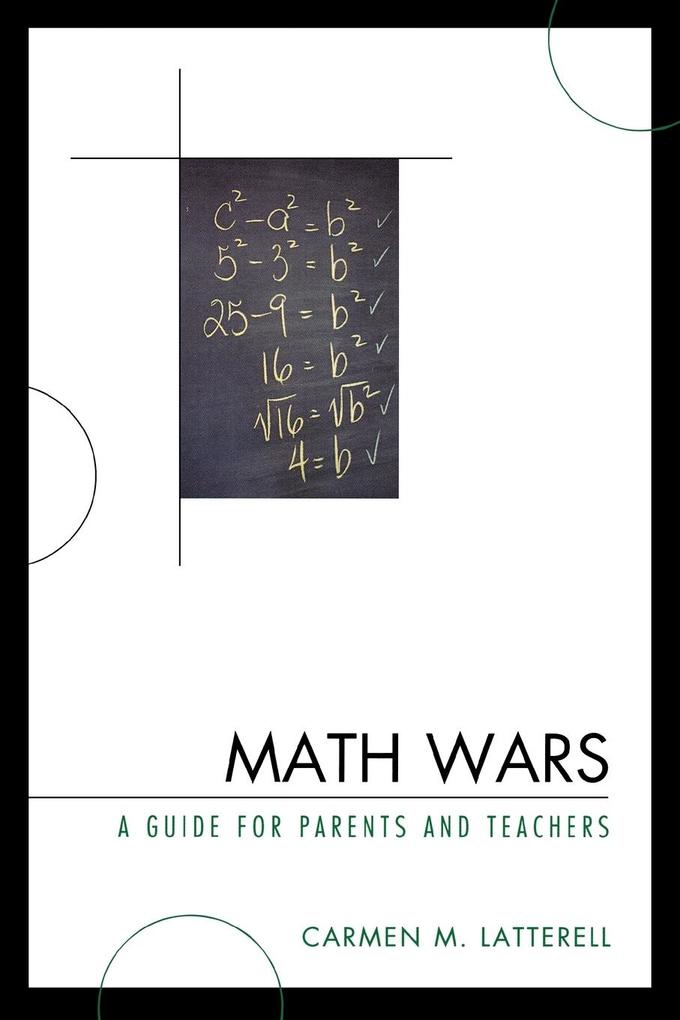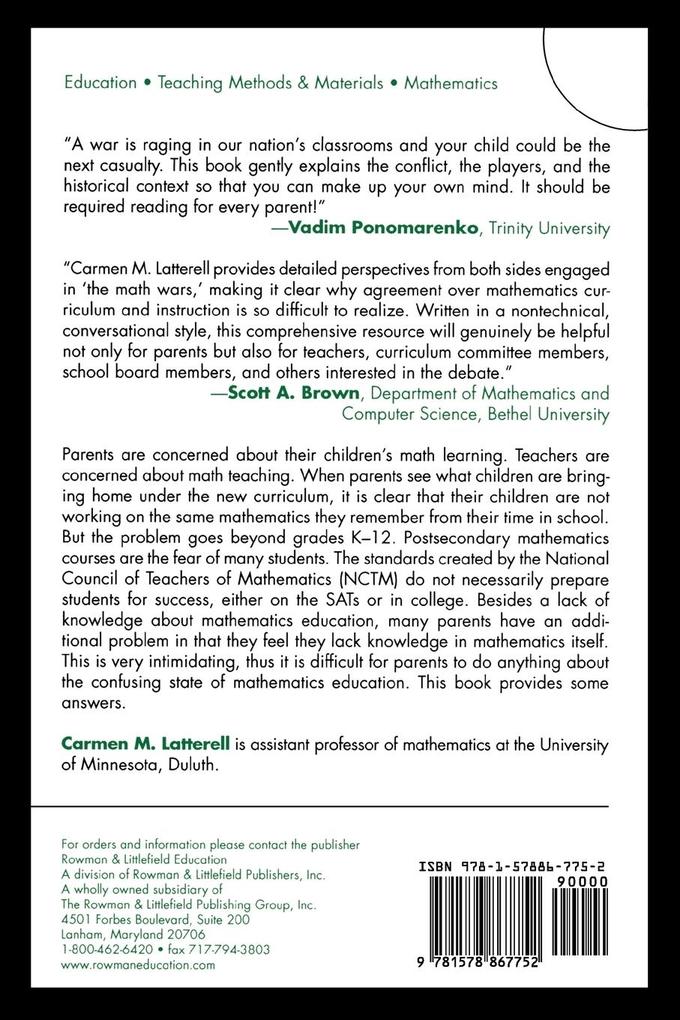
Zustellung: Fr, 04.07. - Di, 08.07.
Versand in 5 Tagen
VersandkostenfreiBestellen & in Filiale abholen:
Parents are concerned about their children's math learning. Teachers are concerned about math teaching. When parents see what children are bringing home under the new curriculum, it is clear that their children are not working on the same mathematics that parents remember from the time when they were in school. But, the problem goes beyond grades K-12. Post-secondary mathematics courses are the fear of many students. The standards created by the NCTM do not necessarily prepare students for success, either on SATs or in college. Besides lack of knowledge about mathematics education, many parents have an additional problem in that they feel they lack knowledge in mathematics itself. This is very intimidating; thus it is difficult for parents to do anything about the confusing state of mathematics education. This book provides some answers.
Inhaltsverzeichnis
Chapter 1 Introduction Chapter 2 What Preceded the Math Wars? Chapter 3 What is Constructivism? Chapter 4 What Does Research Say about the Math Wars? Chapter 5 Who Are the Math Wars Players and on Which Side Are They? Chapter 6 What Are the NCTM Standards? Chapter 7 What Distinguishes NCTM-Oriented Curricula? Chapter 8 What Distinguishes NCTM-Oriented Problems from Traditional Problems? Chapter 9 What Happens to Students as They Reach the College Level? Chapter 10 What Is Happening Internationally in Mathematics Education? Chapter 11 Both Sides of the Question Chapter 12 Additional Resources
Produktdetails
Erscheinungsdatum
05. September 2008
Sprache
englisch
Seitenanzahl
200
Autor/Autorin
Carmen M. Latterell
Verlag/Hersteller
Produktart
kartoniert
Gewicht
298 g
Größe (L/B/H)
229/152/11 mm
ISBN
9781578867752
Pressestimmen
Written by a mathematics educator to help parents and other interested parties understand the great debate about how to teach basic and advanced math. Library Media Connection, April/May 2005 Latterell has done an excellent job of making the language in the book simple, straightforward, and easy to understand for the wides possible audience...It would be good to have a copy of Math Wars on hand to lend to parents, new teachers, or anyone interested in the current and future state of mathematics education. Mathematics Teaching in the Middle School, March 2006 Parents and teachers interested in the cross-country debate about how to teach basic math won't want to miss the debate coverage in Math Wars: A Guide for Parents and Teachers. Here the heated issues between the NCTM curricula and traditional original curricula are discussed with an eye to understanding how kids learn math, what the differences are in what they are bringing home from the new curriculum, and why the standards created by the NCTM don't help prepare students for college. An intriguing survey of the many issues and theories involved in math teaching. The Bookwatch, December 2005 This book will annoy some people (and that is why it was a courageous to write it), but in its final attempt to be fair to both sides of the "Wars" it is a book from which one can learn, and thus a worthwhile book not only for parents and teachers, but for all who are concerned with the state of mathematics education in the USA. Journal For Research In Mathematics Education Readers should read the entire book and understand that simple, balanced views in the midst of strife are difficult to attain. General audiences will gain insights; students of mathematics education and their teachers can read this with an eye toward unpacking the oversimplified. Recommended. General readers, graduate and professional collections. CHOICE, July 2005 Essential reading for all noncombatants-not just parents-caught up in this fratricidal conflict. The text clearly explains how Mathematics (of all things) has become a battleground in the culture wars that characterize our society. Unfortunately, our ability to resolve this conflict and get on with the real business of education students of all backgrounds to high standards of mathematical literacy may determine the economic viability of the U.S. in the next century. This book is a valuable contribution towards that resolution. -- Joseph R. Fiedler, Professor of Mathematics at CSU Bakersfield This is a lively and informative introduction to current conflicts and opinions about what is best for our children. Latterell explains the various positions, places them in theoretical content so that we can understand them, and leaves the final decisions up to the reader. This book shows us why all students are smart, even if there is something they were not taught, and why it is so hard to know what is best in education. Learning theories, the politics of professional associations, and the education of future teachers, are all part of what is hanging in the balance while researchers, policy-makers and curriculum writers bicker over which textbooks should be purchased. In the meantime, what does this all mean for your child? -- Peter Appelbaum, Associate Professor and Coordinator of Mathematics Education Programs at Arcadia University, Philadelphia Carmen Latterell provdes detailed perspectives from both sides engaged in "the math wars," making it clear why agreement over mathematics curriculum and instruction is so difficult to realize. Written in a non-technical, conversational style, this comprehensive resource will genuinely be helpful not only for parents, but also for teachers, curriculum committee members, school board members, or others interested in the debate. -- Scott A. Brown, Ed.D., Department of Mathematics and Computer Science at Bethel University in St. Paul, MN A war is raging in our nation's classroomms, and your child could be the next casualty. This book gently explains the conflict, the players, and the historical context, so that you can make up your own mind. It should be required reading for every parent! -- Vadim Ponomarenko Ph.D, Trinity University in San Antonio, TX Besides lack of knowledge about mathematics education, many parents have an additional problem in that they feel they lack knowledge in mathematics itself. This is very intimidating; thus it is difficult for parents to do anything about the confusing state of mathematics education. This book provides some answers. Zentralblatt Math
Bewertungen
0 Bewertungen
Es wurden noch keine Bewertungen abgegeben. Schreiben Sie die erste Bewertung zu "Math Wars" und helfen Sie damit anderen bei der Kaufentscheidung.










